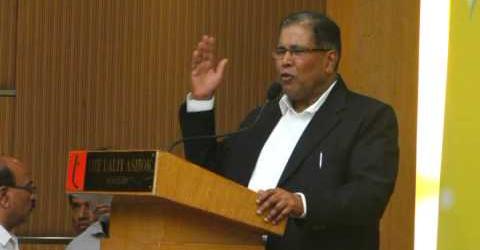Bengaluru, Oct 23: Senior Congress leader Rahman Khan on Saturday said Muslims are not a minority in the country, and called upon them to strive towards nation-building.
"There are about 20 to 22 crore Muslims in the country; according to me, they are not minorities. How can 22 crore be a minority? We have been giving such a colour," Khan said.
Speaking to reporters here, he said he has even written a book 'Indian Muslims: The Way Forward' and asked the community to strive to build the nation.
"We have to contribute to society. We should become good citizens. Instead of asking from the government, we should give to society," he said.
Noting that as per the Article 14, 15 and 16 of the Constitution, if any section or community is backward and needs support, the Constitution provides the government a power to take affirmative action, the former Deputy Chairman of Rajya Sabha said. "So, no party on coming to power is doing any favour to any community," he said.
"The Constitution protects all the citizens. The Constitution is our protector, not any political party..." he said. He said anyone can join any party and that, according to him, no party can claim Muslims are with it.
He was responding to questions on the political slugfest between the Congress and JD(S) leaders over Muslim support ahead of the October 30 Hangal and Sindgi bypolls.
Responding to a question, Khan said minorities are also citizens of the country, and claims by political leaders that the community is being used by someone for the sake of votes is an insult. "Don't minorities have knowledge of who to vote for and whom not to?" he asked.
Stating that minorities have the right to seek for their rights in accordance with what is provided to them under the Constitution, he said, "They don't need any party to ask for their rights, the Constitution is enough."
The former Union Minister further said the Congress is a secular party, and for 70 years as it has stood for protecting secularism, the Muslims support it.
"It is not that Muslims support only Congress. If tomorrow Congress doesn't stand for secular principles, they will have nothing to give to the nation...if tomorrow BJP adopts secularism, they may support them as well," he added.
Let the Truth be known. If you read VB and like VB, please be a VB Supporter and Help us deliver the Truth to one and all.
Mumbai: Ahead of the IPL 2025 clash between Mumbai Indians and Royal Challengers Bengaluru, RCB star batter Virat Kohli opened up about his long-standing bond with Rohit Sharma. Despite past media rumours of a rift between the two, Kohli reaffirmed the mutual respect and strong professional relationship they share.
In a conversation on the RCB channel, Kohli said, “Playing alongside someone for such a long time naturally leads to a strong bond, especially when you share so much of your understanding of the game. In the early years, we were constantly learning from each other and growing in our careers simultaneously.”
He further added that over the years, they had built trust and often found themselves on the same page while making decisions in leadership roles. “Reflecting on our long careers, we are both grateful and proud of the journey we've shared. The consistency and memories we’ve built together have been incredibly fulfilling,” he said.
Kohli and Rohit have played crucial roles in Indian cricket’s success over the past 15 years. While rumours of discord often emerged, both have consistently denied them and maintained professionalism on and off the field.
Meanwhile, Mumbai Indians will aim to register their second win of the season as they host RCB at the Wankhede Stadium. Led by Hardik Pandya, MI have so far won just one out of their four matches, while RCB have two victories in three games.
𝐓𝐡𝐞 𝐑𝐎-𝐊𝐎 𝐛𝐨𝐧𝐝! 🫂
— Royal Challengers Bengaluru (@RCBTweets) April 6, 2025
Virat Kohli talks about his equation with Rohit Sharma, and how they’ve bonded over the years and created some wonderful memories! ✨
We’re just a day away from seeing them go up against each other, and we wish them well! 😌👊#PlayBold #ನಮ್ಮRCB… pic.twitter.com/I6GHFHxgEx





